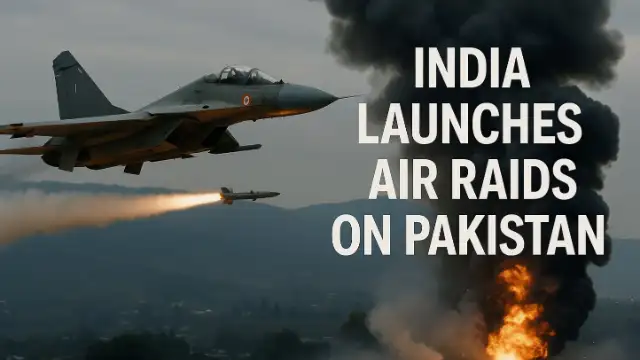India Launches Air Raids on Pakistan Amid Escalating Kashmir Tensions

In the early hours of May 7, 2025, India launched precision air strikes on nine sites across Pakistan and Pakistan-administered Kashmir under the codename Operation Sindoor, targeting what New Delhi described as “terrorist infrastructure” linked to the April 22 Pahalgam attack (reuters.com). Pakistan’s military reported strikes on three locations, including a mosque in Punjab, resulting in eight civilian deaths and more than 35 injuries, and accused India of hitting non-military targets (apnews.com). Local residents in Muzaffarabad recounted being jolted awake by massive explosions and witnessing flares light up the night sky (aljazeera.com). Islamabad condemned the strikes as a “cowardly act of war” and vowed to retaliate “at a time and place of its choosing” (reuters.com). International actors, including the United Nations, United States, and United Kingdom, have urgently called for de-escalation to prevent a full-scale conflict between the two nuclear-armed neighbors (reuters.com).
Background
The disputed region of Kashmir has been a flashpoint between India and Pakistan since their independence in 1947, igniting multiple wars and ongoing insurgencies along the Line of Control (reuters.com). On April 22, 2025, a militant attack in Pahalgam on a group of tourists—primarily Hindu pilgrims—killed 26 people and was claimed by the Resistance Front, a Pakistan-linked group; India immediately blamed Islamabad for harboring the perpetrators (theguardian.com). Diplomatic ties had already deteriorated, with both sides expelling diplomats and trading sanctions; Pakistan conducted ballistic missile tests on May 3, while India carried out military drills near the border in Srinagar (reuters.com).
Operation Sindoor
India’s Ministry of Defence described Operation Sindoor as a “limited and calibrated” strike focusing solely on identified terror camps and support structures without crossing into Pakistani airspace (reuters.com). The nine targeted sites spanned Muzaffarabad and Kotli in Pakistan-administered Kashmir and the Bahawalpur region of Punjab, aimed at camps allegedly run by Lashkar-e-Taiba and Jaish-e-Mohammed (thetimes.co.uk). Explosions in Muzaffarabad caused temporary power blackouts, and witnesses reported large plumes of smoke and nighttime flares following the missile impact (aljazeera.com).
Casualties and Damage
Pakistani authorities confirmed at least eight civilian fatalities—including two children—and 35 injuries, with two mosques in Punjab sustaining damage while congregants were inside (apnews.com). The Pakistani military also claimed to have shot down multiple Indian fighter jets and captured several soldiers, claims that India has denied, insisting no Air Force assets were lost (reuters.com).
Live Reporting
“I woke up to a thunderous blast and saw flares lighting up the sky. Houses shook for several seconds,” said a Muzaffarabad resident to the BBC, describing the sudden assault amid the pre-dawn darkness (aljazeera.com).
Pakistan’s Information Minister Fawad Chaudhry announced an extraordinary session of the National Security Committee at 10:00 PST (05:00 GMT) and declared that the nation would respond decisively (apnews.com).
International Reactions
The United Nations Secretary-General António Guterres warned that “the world cannot afford a military confrontation between two nuclear-armed states” and urged both Delhi and Islamabad to exercise maximum restraint (reuters.com). The United States and United Kingdom echoed calls for calm and dialogue, while Iran offered to mediate talks to defuse the crisis (theguardian.com).
Analysis and Outlook
Analysts caution that although India framed the strikes as limited, the risk of miscalculation along a heavily militarized border remains high, especially after Pakistan’s pledge of retaliation and subsequent cross-border shelling (reuters.com). With both sides commanding nuclear arsenals, global powers are likely to intensify diplomatic efforts to prevent escalation, but long-term stability in Kashmir hinges on addressing the underlying territorial dispute—a prospect that has eluded peaceful resolution for decades.
